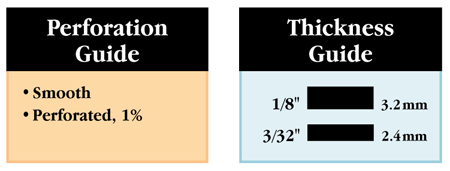Solaris (tm) splinting thermoplastic provides controlled stretch and drape to allow firm handling for a rigid, conforming splint. Moderate to maximum resistance to stretch means the material can be stretched and pulled around curves without thinning or growing out of control. This allows the splinter to aggressively hold and stretch the material. Moderate drape allows Solaris (tm) to take on the contours of the hand for an intimate fit using only moderate pressure. The thinner material follows the curves of the hand and fingers with minimal handling. It has moderate memory so the material will spring back slightly while warm. Splints made with Solaris (tm) are rigid and will hold their shape against the pull of strong dynamic components and against hypertonicity. Uncoated Solaris (tm) provides a slightly sticky surface when warm to keep the material in place for an intimate fit. A permanent bond can be achieved by applying dry heat and pinching it together firmly. No solvent is needed. The surface resists fingerprinting,and marks disappear or can be smoothed away by rubbing the surface gently while the splint is warm. Solaris (tm) leaves sealed, smooth edges when cut warm.
Solaris (tm) is ideal for abnormal tone conditions or joint contractures when patients are unable to cooperate. Its unique qualities make Solaris (tm) perfect for upper and lower extremity positioning splints and pediatric, non-weightbearing AFOs.
The combined drape with controlled, resistant stretch of Solaris (tm) allows aggressive, firm handling to form a rigid splint that conforms perfectly to the body.
Solaris (tm) takes four to six minutes to form and harden after softening in 160 degrees F (71 C) water.








